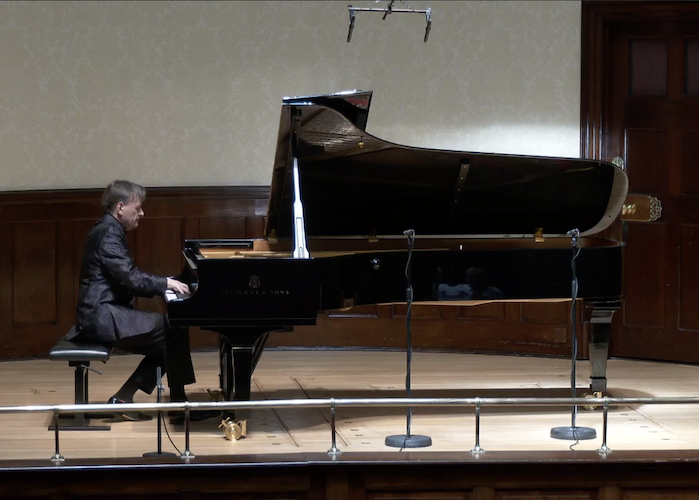Live classical music at last returned to the capital yesterday, as celebrated pianist Stephen Hough played Bach and Schumann at the Wigmore Hall, in the first of 20 live lunchtime concerts every weekday in June.
There was no audience in the intimate 545-seat hall behind Oxford Street, with its acclaimed acoustic, except for a sound engineer and a producer – the concert went out live on Radio 3, as well as on the Wigmore website – plus a presenter in the auditorium and one member of the Wigmore Hall staff on duty, all more than two metres apart throughout. It’s a “London-centric series” too, according to Wigmore Hall director John Gilhooly. The featured artists, exclusively soloists or duos, are all based in the capital and will travel in on foot or by bike, rather than public transport.
For Gilhooly, the series is a “glimmer of hope” and a “morale boost”, for audiences, artists and administrators. The venue is looking to expand its live programme, with larger numbers of musicians taking part, including “maybe a string quartet” in the autumn. The BBC is also considering two weeks of live concerts in September, possibly with an audience of some sort if regulations allow, to round off what will have been, for the first time in 125 years, a curtailed Proms programme.
But the future for classical music, and arts and culture in the capital more generally, remains uncertain without government support, Gilhooly warned as he announced the series. “We don’t know where we are heading or what the rest of the year may bring. This could be a crisis lasting more than a year,” he said. “We can survive into next year, but it’s not just about the Wigmore Hall. Others could go under in the next six to eight weeks.”
To prove the point, Southbank Centre chief executive Elaine Bedell announced last week that the centre, the largest cultural setting in the capital, could stay closed for a year, with its reserves and £19 million Arts Council grant used up, a £5 million deficit by next April, and even greater losses if it opened under present social distancing rules. The venue hosts eight orchestras, including the London Philharmonic, and attracts nearly five million visitors to more than 3,500 events every year.
The Barbican, home to the London Symphony Orchestra, regularly rated among the top five orchestras in the world, has also reported “significant impact” on its business model and revenue, though it is cushioned by its status as part of the City of London Corporation, which is its major funder.
The prospect of the South Bank without the Southbank Centre or a scaled-back Barbican focuses minds on the wider importance – and vulnerability – of the culture sector in London. Cultural and creative industries as a whole are worth £52 billion to the capital’s economy and account for one in six jobs, according to City Hall, and London’s cultural offer is the main draw for 80 per cent of the 32 million or so overseas and domestic tourists visiting each year.
Cultural centres like the Wigmore Hall, which sells some 200,000 tickets a year for more than 450 concerts, also offer education and access programmes, subsidised or even free tickets for particular groups and important backing for young musicians embarking on professional careers.
The current crisis is hitting the industry hard. In evidence to the culture select committee published last week, the Barbican highlighted the links between established and smaller venues, complex supply chains and the often long lead times for commissioning and creating. Substantial parts of the sector “could be significantly compromised”, affecting large and smaller organisations and early to mid-career artists and freelancers, unless the government takes action to “protect the cultural ecosystem at all levels”, the Centre said.
Arts organisations and individuals qualify for general government support to business, depending on their status. The Arts Council is currently distributing £160 million in emergency funding, while a government “task force” developing “blueprints” for safe reopening, chaired by culture sectary Oliver Dowden, has just been announced.
But venue chiefs say more is needed, now and longer-term. They’re joined by Sadiq Khan, who has launched his own emergency £2.3 million fund for grassroots music venues, LGBTQ+ venues, artists and independent cinemas. “These industries are so important to the fabric of our city…and they will play a key role in helping us to recover from this public health crisis,” the Mayor said. “I’m pleased to offer this emergency funding to those areas most at need, but we need the government to step forward and provide the comprehensive support this industry needs to protect its future.”
For Gilhooly at the Wigmore Hall, even with the benefit of private benefactors, one of whom is supporting this month’s programme, ticket sales still make up 60 per cent of revenue. “We need an injection of cash from government.”
Throughout its 120-year history the Wigmore has attracted the finest performers, including legendary pianist Arthur Rubinstein, who made his London debut at the hall in 1912. As he concluded the final recital of his career there 64 years later, he urged the audience to “keep coming back to this wonderful Hall”. Let’s hope we can.
Full details of the Wigmore Hall June series are here.
OnLondon.co.uk is committed to providing the best possible coverage of London’s politics, development and culture in the midst of the coronavirus crisis. The website depends on donations from readers. Individual sums or regular monthly contributions are very welcome indeed. Click here to donate via PayPal or contact davehillonlondon@gmail.com. Thank you.

